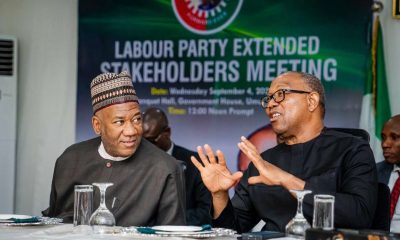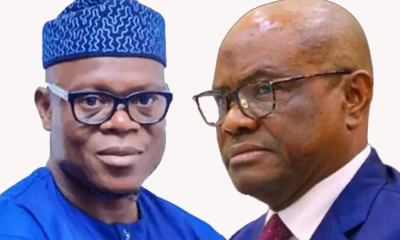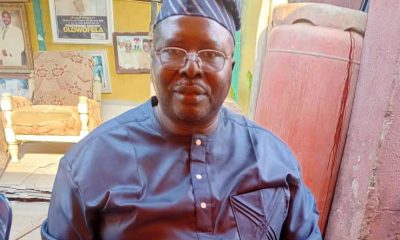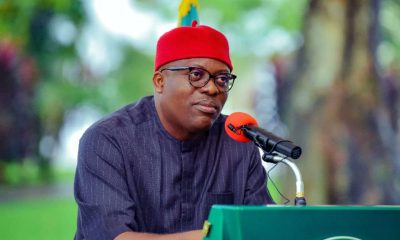Headlines
Jonathan, Obi, Makinde jostle for PDP ticket… as party battles zoning, anti-party activities

The 2027 presidential ticket of the Peoples Democratic Party (PDP) is shaping up to be an epic battle among its leading potential contenders, including former president, Goodluck Jonathan, former Labour Party presidential candidate, Peter Obi, and Oyo State governor, Seyi Makinde.
Although Jonathan has yet to formally declare his ambition, mounting pressure from influential political blocs, especially in the North, suggests that the former president remains a major factor in the race.
Sources close to him confirm that he has quietly intensified consultations in recent months. Last week, his cousin Robert Azibaola dismissed reports suggesting that Jonathan had ruled out another bid for power, further fueling speculation that a comeback is on the cards.
Azibaola, who was reacting to a story published by Newsweek Nigeria, titled “Jonathan Rejects Pressure to Contest in 2027, says, He Won’t Be Used Against Southern Unity,” urged Nigerians to ignore the report, describing it as fake.
He also clarified that the so-called “aide of Jonathan” quoted as a source in the report does not exist. According to Azibaola, while Jonathan has yet to announce his decision, he has not ruled himself out of the race.
“The former president has made it clear that he would not yield to calls not to run, since those making such admonitions had selfish motives,” Azibaola stated on Friday, without disclosing when Jonathan might make a formal declaration.
The Jonathan’s Option
Jonathan’s potential candidacy is driven largely by a calculation among anti-Tinubu elements in the North that he represents the safest bet to wrest power from the All Progressives Congress (APC) without upsetting Nigeria’s delicate ethnic and regional balance.
“They favour him because he is constitutionally barred from contesting another term after 2027,” a northern PDP chieftain told Business Hallmark.
“For them, Jonathan would be a one-term transition president, who could pave the way for the North to reclaim power in 2031.”
For Jonathan, however, the road back to the Villa is fraught with irony. After conceding defeat in 2015 and declaring he would never seek re-election, his possible comeback underscores the desperation within PDP ranks.
Insiders say some northern elders see him as a “compromise candidate” because he is constitutionally limited to one term, creating a pathway for a northern presidency in 2031.
However, this argument faces pushback from those who want the former president to remain as statesman and to stay away from engaging in electoral contest.
The Obi Factor
Peter Obi, the former Anambra State governor, and Labour Party’s presidential candidate in 2023, remains a compelling figure in the unfolding drama. Despite running on a relatively small political platform during the last election, Obi polled over six million votes and won across several key states, consolidating his reputation as a reformist alternative.
Many PDP stakeholders now see Obi as a possible unifier and a strong challenger to Tinubu, should he return to the party. “Discussions have been ongoing, but Obi has made it clear that he would only return if there is a guarantee of the ticket,” a close associate disclosed.
Obi enjoys overwhelming support in the South East and significant goodwill in the South South and North Central zones. However, his prospects in the core North remain shaky. His pledge to serve only one term has not fully convinced northern political leaders, with the influential Arewa Consultative Forum recently casting doubt on the promise, insisting that “politicians cannot be trusted on such commitments.”
Nonetheless, the former Obi could potentially inject fresh energy into the PDP with his massive following among the country’s tech savvy youth population known as the Obedients.
“I’m aware that certain individuals have been talking to Peter Obi to come back home,” said Abba Moro, the senator representing Benue south on Channels TV on Tuesday. “Hey, come back home, this is what we are likely to do, and if you come, you stand a chance of being the candidate.”
For Obi, the calculus is different from that of Jonathan. While his popularity among young voters remains strong, returning to the PDP could alienate core supporters, who see him as a symbol of third-force politics. Yet, many analysts believe the Labour Party lacks the grassroots structure to win in 2027 without alliances.
“Obi knows that running again on LP will likely produce the same result,” said Ken Nnaji, a PDP youth leader in Enugu. “The PDP has the spread, the governors, the resources. The question is: will they hand him the ticket? If not, will he join a coalition?”
The coalition option under ADC is gaining traction among opposition figures, with talk of an All Democratic Alliance (ADA) involving PDP, LP, and elements of the NNPP. However, everything suggest that it is Atiku Abubakar, former vice president’s platform. However, history suggests that Nigerian politicians struggle to sustain such pacts. Ego clashes, funding disputes, and regional mistrust often doom them before they take off.
Makinde’s Ambition Faces Regional Hurdles
Seyi Makinde, the influential Oyo State governor and a leading voice in the PDP, had declared himself fit to be Nigeria’s president, and is also widely believed to be nursing presidential ambitions.
Makinde’s close allies suggest that he views 2027 as his best opportunity to step into national politics, especially with the party’s recent decision to zone its ticket to the South.
However, analysts argue that Makinde faces a steep uphill task. His Southwest base is dominated by President Tinubu, whose political structure remains formidable across the region.
“Makinde will find it difficult to challenge Tinubu in the Southwest, and that leaves him without a stronghold,” political analyst, Chidi Anthony, noted. “His popularity outside the Southwest is still uncertain, which weakens his chances of emerging as a strong candidate.”
Makinde’s path to relevance may, therefore, depend on cutting strategic deals with power brokers in the South South, North Central, and parts of the North East, which are critical in PDP’s zoning matrix.
Speaking in an interview on Thursday, Bauchi State governor, Bala Mohammed, said himself and Makinde, would form a “perfect match” on a joint ticket if the PDP fields them in the 2027 presidential election.
Mohammed dismissed speculations that he had already been tipped as Makinde’s running mate, but maintained that the option remains open for the PDP. He argued that the party must present a Christian from the South as its presidential candidate, with a Muslim from the North as running mate, to reflect Nigeria’s diversity, and avoid the controversy of a Muslim-Muslim ticket.
“What Nigerians need is capacity and pedigree, which Seyi and I have demonstrated at the subnational level. But beyond us, there are several credible options within the PDP. What matters is that the party remains open and inclusive,” he said.
Mohammed added that the PDP would not repeat what he described as the ruling APC’s “mistake” in 2023, stressing that zoning and religious balancing must guide the party’s choice of candidates.
Makinde’s supporters frame his candidacy as a generational shift, a bid to inject new energy into the PDP. The Oyo governor, one of the few PDP leaders, who navigated the Wike-Atiku crisis without losing relevance, sees himself as the bridge between the old guard and emerging political forces.
But his path is narrow. The Southwest remains Tinubu’s fortress, and Makinde lacks the pan-Nigerian name recognition of Jonathan or Obi.
The Wike Problem: Trojan Horse in the Ranks
As these aspirants quietly position for the PDP ticket, the party faces a more existential challenge: the disruptive influence of Nyesom Wike, former Rivers State governor, and current Minister of the Federal Capital Territory. Wike, a key ally of President Tinubu, has openly vowed to ensure that the APC retains power beyond 2027, a mission that effectively casts him as a Trojan horse within PDP ranks.
Wike’s influence is not to be underestimated. As leader of the G-5 governors, who revolted against PDP’s leadership in 2023, his rebellion cost the party critical votes in several swing states, paving the way for Tinubu’s victory.
Today, his grip on Rivers State politics, despite his feud with Governor Siminalayi Fubara, remains strong, and his network of loyalists stretches across the South-South and beyond.
“Wike has the resources, the federal backing, and the determination to frustrate PDP’s 2027 bid,” said Anthony, a lawyer. “Unless the party finds a way to neutralize him, Wike could sabotage the PDP from within, or even midwife a new political alignment favorable to Tinubu.”
Since his controversial role in the 2023 elections, when the G-5 governors effectively undermined Atiku, Wike has tightened his grip on Rivers politics and built bridges with Tinubu. His control of critical structures within the PDP remains strong, and party insiders fear he could deploy these assets to weaken the PDP from within.
“Wike has made no secret of his admiration for Tinubu,” said a PDP NEC member. “He believes Tinubu saved him from political oblivion after the election, and he is determined to return the favor in 2027. His game plan is to ensure that the PDP remains fractured and unable to present a united front.”
This suspicion was amplified when Wike openly supported the controversial emergency rule declaration in Rivers earlier this year, a move widely seen as consolidating Tinubu’s influence in the oil-rich state.
According to a senior PDP strategist, “If Wike throws his weight behind Tinubu, we will have a repeat of 2023. The South South will be divided, and that is fatal for us.”
Zoning Row: South vs North Central Showdown
Compounding PDP’s troubles is the deepening rift over zoning. The party’s National Executive Committee (NEC) recently resolved to zone its presidential ticket to the South, ostensibly to maintain equity after Atiku Abubakar’s 2023 bid. However, the decision has triggered protests from North-Central leaders, who feel sidelined.
“Zoning the presidency to the South is against the constitution of the federal Republic of Nigeria. The Constitution does not permit any party to zone elected political offices, such as the president on account of region. It is discriminatory. This has never been done by any political party in Nigeria’s history,” argued Gbenga Olawepo-Hashim, a prominent PDP chieftain from Kwara, North Central.
“People may have their sentiments, but they don’t come at the platform of a party, such as the NEC to pronounce that they have closed the door to certain regions. The danger in this kind of thing is that you pitch one section of the country against another. Nigerians are not interested in where the president comes from. They want a competent president.”
Some observers from the zone argue that the North Central has never produced a president, or vice president since 1999, therefore, it would be unfair for the PDP to shut the zone out in 2027.
The zoning crisis is not limited to North Central grievances. Within the South, subtle rivalries are also emerging. South East leaders argue that having consistently backed PDP since 1999, the ticket should be ceded to the region. Conversely, the South South, home to Jonathan, contends that it remains PDP’s strongest base, and deserves the nod to produce another president.
Fragmented Opposition, Rising APC Confidence
Beyond its internal battles, PDP faces a strategic dilemma: how to reinvent itself as a credible alternative to the APC amid a worsening economic crisis and growing public disillusionment. While hardship and inflation have eroded Tinubu’s popularity in many quarters, many argue that the opposition remains too fractured to capitalize on the anger.
Talk of a grand coalition involving PDP, Labour Party, and other opposition forces has gained traction in recent months. But such efforts have been hampered by mutual distrust and clashing ambitions.
“Coalitions in Nigerian politics often look good on paper, but collapse under the weight of personal interests,” said Anthony. “Unless these actors can subsume their egos for the greater good, the APC will waltz to victory in 2027 despite its current unpopularity.”
The zoning debate is further complicated by the party’s electoral calculus. In the 2023 presidential election, Atiku secured a large chunk of votes from the North, while Obi dominated the Southeast and parts of the South South. Jonathan, if he runs, could reclaim some of these votes, but his chances in the North hinge on alliances with governors and power brokers, who may still resent his 2011 to 2015 presidency.
“Zoning is our greatest dilemma,” admitted a member of the PDP Board of Trustees, who requested anonymity. “If we zone South, we risk losing northern votes; if we keep it open, we anger the South, which feels betrayed by Atiku’s candidacy last time.”
Public perception remains a hurdle
While many Nigerians are disillusioned with the Tinubu administration amid rising inflation, fuel price shocks, and unemployment, there is skepticism that the PDP offers a better deal. “People are angry at APC, but they don’t trust PDP either,” noted political analyst Olagoke Hassan. “The party has not presented a coherent economic vision. Instead, it’s about, who gets the ticket.”
The PDP’s internal democracy record is also under scrutiny. Obi’s departure in 2022 was partly due to the monetisation of primaries, a culture critics say persists. If the party hopes to lure him back or keep Makinde in play, it must guarantee a level playing field, a tall order given entrenched godfathers, analysts say.












